Egypt
Egypt, in long form the Arab Republic of Egypt is a country located in North-East Africa and, for the Sinai Peninsula, in West Asia. Located on the south coast of the eastern Mediterranean, the Levantine basin, present-day Egypt occupies the geographical space that was once that of ancient Egypt. With more than 100 million inhabitants in 2017, Egypt is the third most populous country in Africa after Nigeria and Ethiopia. In very strong growth, its population has multiplied by four in sixty years. Its capital is Cairo and its currency is the Egyptian pound. The official language of the country is Arabic, used in all documents and in education. On the other hand, the language spoken is Egyptian Arabic (dialectal Arabic). Siwi tamazight (Berber) from the west of the country is spoken in Siwa. The Coptic is only used as a liturgical language for Christians in Egypt. Nubian is spoken by the people of Upper Egypt, in the province of Aswan, a region commonly known as Nubia.
Egypt’s history
For almost three millennia, the Nile Valley saw one of the most brilliant civilizations in history flourish. The invention of an original writing in the form of syllabic ideograms, the hieroglyphs, shortly after the appearance of the cuneiform in Mesopotamia around -3300, helped to bring the human species out of Prehistory. The Egypt of the pharaohs was thus able to flourish to reach its peak in the 13th century BC, leaving a monumental work on the world heritage. After numerous invasions and various occupations (mainly Persians, Greeks, Romans and Byzantines), in the first century was formed the Christian community, converted by Saint Mark, the Copts (Arabic deformation of the Greek word Aiguptios: Egyptian). Today there are several million. The country then passed under Arab domination in the 7th century, then Ottoman. Méhémet Ali, who reigned until 1848, appeared as a great reformer of the country whose structures he modernized. It uses the state to carry out an industrial revolution. It established state monopolies, bought modern textile machinery in Europe, built blast furnaces and steel mills, confiscated the land of the Mamluk owners and cultivated food there for export. In 1830, Egypt ranked fifth in the world for cotton spindles per capita. The European powers are worried about his influence and decide to wage war on it. Britain sends its fleet to help the Ottoman Sultan restore his authority over Egypt, bombing Lebanese ports controlled by Egyptians and landing troops in Syria. In 1841, Mehemet Ali must cede control of Syria by the Treaty of London. Egypt was also forced to lay off its army, dismantle its monopolies and accept a free trade policy imposed by the British which led to its deindustrialization. Lord Palmerston admitted with a certain cynicism: “The submission of Mohammed Ali to England […] might seem unfair and biased, but we are biased; and the best interests of Europe demand that we be “.
The successors of Méhémet Ali, whose semi-independence is recognized in 1867 with the title of khedive, fall under the dependence of the European financial institutions and, after the nationalist revolt of colonel Ahmed Urabi, Egypt is conquered by the British Empire after a short war in 1882 while remaining nominally Ottoman. During the Mahdist War between 1881 and 1899, the Anglo-Egyptian troops confronted the Mahdists who captured Sudan: their victory gave birth to an Anglo-Egyptian Sudan de facto dominated by the British. Between 1914 and 1919, Great Britain will try to make Egypt a simple colony, considering that the simple protectorate could ultimately jeopardize British interests if the Arab nationalists managed to change the status of the country under guardianship.
The kingdom of Egypt gained independence in 1922. Despite a long Ottoman and then British tutelage, its culture remains today still strongly marked by the Arab identity, of which President Gamal Abdel Nasser was one of most famous pioneers. Nasser’s government is undertaking infrastructure upgrades and an industry for Egypt. Nationalizations are carried out and the public sector becomes preponderant. Many social policies are promoted (land reform, free education, minimum wage, reduction of workers’ working hours, etc.). Anouar el-Sadat succeeds him and launches the policy of the Insfitah (opening) which aims, by reducing the role of the State, to attract foreign investments. A class of new rich is growing rapidly. In 1975, there were more than 500 millionaires in Egypt but more than 40% of the population lived below the poverty line and shantytowns developed around the capital. In addition, the country accumulates a monumental debt during the years of the Insfitah. In order to restructure it, the IMF asked for the abolition of all subsidies for basic products which caused riots in January 1977. The government brought in the army, generating an unknown number of victims. In the countryside, Sadat seeks the support of the traditional rural elites, whose influence had declined under Nasserism. Peasants are expelled from disputed lands.
After the assassination of Sadat (1981), Hosni Mubarak was President of the Republic until February 2011, the date of his forced resignation following the Egyptian Revolution in 2011. Hosni Mubarak continued the policy of liberalization of the economy, notably by reducing subsidies to agriculture and consumption, and by liberalizing prices. In 1992, he canceled the provisions governing the leasing of land. Generally called the “law to drive peasants out of their land,” this law, combined with other measures to disengage the state from the economy, increases the discontent of the rural poor, especially in Upper Egypt. Hosni Mubarak becomes a pillar of the regional strategy of the United States and the Constitution which it establishes recognizes the “principles of Sharia” as the main source of legislation.
In January and February 2011, a series of demonstrations of unrivaled scale took place across the country and led to the resignation of Hosni Mubarak on February 11. The new legislative and presidential elections were won by the Freedom and Justice Party, the political arm of the Muslim Brotherhood. Power, however, remained only in their hands for a short time because major protests against the elected president, Mohamed Morsi, criticizing dictatorial abuses, and the overthrow of the army against him deposed him in favor of ” a transitional government only one year after his election. Egypt has known since a period of unrest caused by instability and political tensions, especially between opponents of the former president and those who continue to support him and do not accept what they see as a coup d ‘Illegal state. In May 2014, Abdel Fattah al-Sissi, already considered the de facto leader of Egypt, won the presidential election. He was re-elected for a second term in 2018. By a constitutional revision validated by a referendum in April 2019, he gave himself the possibility of remaining in power until 2030. He imposed an authoritarian regime, repressed all opposition and all critical voices, and puts media and justice under control. In addition to its monumental works such as the Suez Canal or the Aswan High Dam, Egypt remains world famous for its archaeological riches present in prestigious international museums. The disappearance of numerous archives, however, means that its history remains fragmentary, although the evolution of technologies makes it possible to better grasp its size and scope.
Egypt’s politics
Executive power is held by the President of the Republic. Since 1981, Hosni Mubarak has held the post of president, re-elected in a referendum every six years. In 2005, the election for the presidency was opened for the first time to other candidates. The legislative power belongs to the People’s Assembly (members elected for a period of five years by universal suffrage). Finally, a consultative assembly, called the Choura, is consulted by the President of the Republic and the People’s Assembly on political decisions. This assembly is made up of 265 members, two thirds of whom are elected, and one third appointed by the President of the Republic. President Hosni Mubarak resigned from his post on February 11, 2011 following protests from the Egyptian people. After the election of a Muslim Brotherhood candidate, Mohammed Morsi, as head of the Egyptian state for a year, Marshal Al-Sissi has held the highest office since 2014. Christians, who represent around 15% of the population, are almost unrepresented in administration or politics.
Human rights and freedom of expression
Since the independence of the country succeed the power of the authoritarian soldiers. False trials, rigged elections, and arbitrary detentions are common. Under Hosni Mubarak, many organizations denounce massive violations of human rights (torture, censorship, arbitrary detentions, unfair trials, etc.). The frequency of these acts decreases from 2011, but after the coup in July 2013, the human rights situation returns to its previous level. Under the presidency of Abdel Fattah al-Sissi, political opponents and journalists are regularly imprisoned when they do not disappear and their conditions of detention (for example in Tora prison) are denounced as contrary to human rights by NGOs from defense of human rights; torture and death have been reported in particular. Hundreds of attacks on press freedom are also listed by the NGO Egyptian Commission for Rights and Freedoms in a report published in 2015. In May 2017, the sites of several media are blocked by Egypt after criticisms towards the regime. This is particularly the case with Aljazeera, whom the government accuses of supporting the Muslim brothers. Bloggers are finally arrested such as secular activist Sherif Gaber or human rights activist Wael Abbas in May 2018. Excision has been prohibited since a 1996 decree confirmed by the Court of Cassation in 1997. Up to 96% of married Egyptian women are however excised. According to UNICEF in 2012, 91% of adult women are cut, but only 16% of young girls have been mutilated since the ban. Demonstrations come to contest Marshal al-Sissi’s regime in October 2019; 4,000 people are arrested.
Egypt’s economy
The country is in the grip of great economic difficulties, in spite of oil resources and especially natural gas. Poverty is increasing there. Formerly essentially agrarian, the Egyptian economy is now trying to diversify into areas such as tourism or industry. The main economic partners of Egypt in 2004 were the United States, the European Union, China, India, Pakistan and Japan. The main economic resources of Egypt are oil and natural gas, income from the Suez Canal, tourism, metals and agriculture (especially cotton). The country was among the top eight cotton producers in East, South and North Africa in the mid-2010s. Egypt’s primary resource in foreign currency and one of its main sectors of activity, tourism, which represented 11% of GDP before 2011, fell sharply with the jihadist attacks. The country is also largely dependent on international aid. Among its weak points is its agricultural production, it was thus second to the list of world importers of cereals in the mid-2010s.
The regime of Marshal Abdel Fattah al-Sissi is moving towards an austerity policy which includes reducing energy and electricity subsidies, imposing a VAT and increasing the price of tickets for the Cairo metro. This form of regressive taxation places a heavier burden on the working and middle classes than before; on the contrary, corporate income tax has decreased. A new austerity plan was adopted in November 2018 and is reflected in particular in the freezing of the salaries of civil servants. The number of beneficiaries of food subsidies has decreased by 3 million following these reforms Debt reached a record level in June 2018 ($ 92.64 billion), which represents an increase of 17% in a single year. The debt is in particular the consequence of the weight of the military budget. (arms imports increased by 215% in 2013-2017 compared to 2008-2012) and interest payments, which reached 31% of the annual budget for the 2016-2017 fiscal year, and 38% in 2018. On the other hand, investments in education, health and infrastructure are insufficient. About 60% of the Egyptian population lives in poverty or precariousness according to a report published by the World Bank in April 2019. General living conditions tend to deteriorate. More than 32% of Egyptians live in poverty in 2019 according to official statistics (less than 1.7 euros per day), i.e. more than 30 million people. Poverty has increased by more than 11% in the country’s largest cities (Cairo, Alexandria, Port Said, Suez). The poorest half of the population only benefits from 17 to 18% of the GDP.
Egypt’s demography
With more than 95 million inhabitants in 2017, Egypt is the third most populous country in Africa after Nigeria and Ethiopia. Egypt is also the most populous country in the Arab world, the Middle East and the Mediterranean basin. Its theoretical density is 95 inhabitants / km2, but in the Nile Valley and its delta only, with the canal area (53,000 km2, or 5% of its surface area, only habitable, and largely urbanized), it is evaluated at 1,500 inhabitants / km2. In fifty years, the country’s population has multiplied by 3.5 with, for the past few years, an average demographic growth of more than 2% per year. This galloping demography leads to many complications such as the lack of housing, infrastructure, schools and jobs, not to mention the rising cost of living. The population is very young: the median age is around twenty-four and one in three Egyptians is under the age of fifteen. On February 11, 2020, the country crossed the 100 million mark, it is the most populous Arab country and it is the 3rd most populous country in Africa behind Ethiopia and Nigeria.
Egypt’s education
The essential characteristic of the bilingual Egyptian-French landscape is its diversity. The types of establishments have different statuses (experimental schools, Al Horreya high schools, investment schools, denominational schools). Seventy-two so-called “bilingual” schools teach reinforced French (LV1) to 45,000 students. The lessons are given by around 2,000 teachers, including around fifty French people. Flagship of another aspect of bilingualism in Egypt, the French Lycée in Cairo educates more than 1,600 students, 47% of whom are French and 32.5% Egyptian. The French Institute in Egypt (Cairo, Alexandria and Heliopolis offices) also participates in the teaching of French in Egypt with some 22 classrooms giving lessons 7 days a week just for the main office from the Mounira district of Cairo. To this must be added the 10,000 additional pupils distributed in the five other Cairo establishments, as well as in the lycée of Alexandria, the lycée of Port Said, the small French schools of Sharm el-Sheik, Hurghada and the numerous institutes and schools in French courses which pursue the same objective. However, today there are private Catholic colleges, which provide French education, and this from the Second. Students also take the French baccalaureate, as does the French lycée in Cairo. The colleges of the sacred heart of Ghamra, the mother of God, the holy family and the college of La Salle are examples. Finally, as a significant component of the French-speaking educational landscape in Egypt, the number of students, supervised by around 10,000 teachers, who study French as a second living language (LV2), is estimated at around 1.7 million. As for private Christian schools of French-speaking education (some of which are very old and prestigious such as the Jesuit College of the Holy Family in Cairo (CSF) or the College Saint-Marc in Alexandria), they now welcome a majority young Muslims and a minority only the traditional Christian elites (Copts but also Egyptian Christians of Syro-Lebanese or Armenian origin). In theory, a contract with the Egyptian State ensures control of the educational content.
Egypt’s language
The official language of Egypt is modern standard Arabic. The Egyptian dialect resembles classical Arabic, despite some differences in pronunciation of some letters and the vocalization of certain words which change according to the provinces and the villages. Two letters stand out in particular: ج and ق; for example, for the first the word beau is pronounced jamīl in Upper Egypt and gamīl in Lower Egypt, for the second the word cupola is pronounced gubba in Upper Egypt and ʔubba in Lower Egypt. International language par excellence, it is English which, as a foreign language, exercises the most influence (school, administration) in Egypt today, but French has long been the language of the bourgeoisie and international justice. Today the influence of French has diminished, although the widening of the Francophile character of Egypt has grown in recent years.
-
Egypt
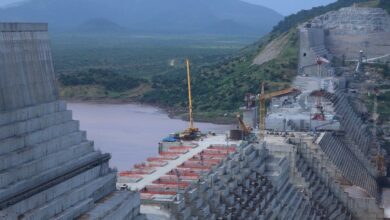
Sudanese Minister Reiterates Importance Of Reaching Final Deal On Controversial GERD
Sudanese Irrigation and Water Resources Minister Yasir Abbas on Wednesday reiterated the importance of reaching an official agreement on the…
Read More » -
Egypt

Ethiopian Government Completes Second Phase Of Filling Of Controversial Nile Dam
The Ethiopian government on Monday said it had fulfilled its second-year target for filling the mega Nile dam, a move…
Read More » -
Egypt
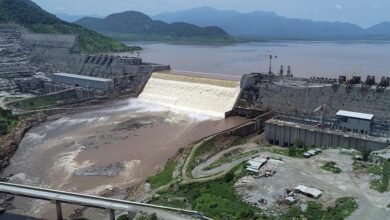
Egypt, Sudan Calls Out UNSC To Intervene & Resolve Nile Dam Issue With Ethiopia
Egypt and Sudan on Thursday urged the United Nations Security Council (UNSC) to intervene and undertake preventive diplomacy and call…
Read More » -
Egypt
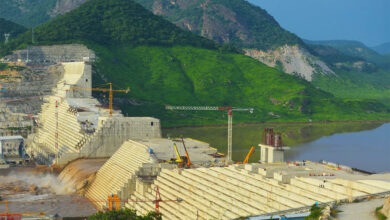
Egypt, Sudan Gets International Support From Saudi Arabia, Tunisia Over GERD Issue
Egypt, Sudan, and Ethiopia’s long-running Nile dam dispute is getting intense as the Ethiopian government has begun the second phase…
Read More » -
Egypt

Egypt: Irrigation Ministry Rejects Ethiopia’s Second Stage Filling Of Giant Nile Dam
The Irrigation Minister of Egypt, Mohamed Abdel Aty, on Monday, said he had received official notice from Ethiopia that it…
Read More » -
Egypt
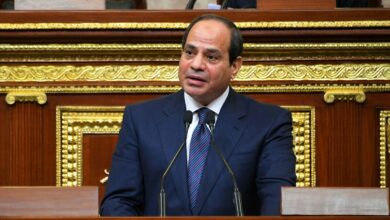
Egypt’s Ministry Signs Cooperation Protocol With South Sudan To Build Wau Dam
Egypt’s Ministry of Irrigation on Saturday said that the government has signed a cooperation protocol with South Sudan’s Ministry of…
Read More » -
Egypt

Sudanese Minister Urges UN Security Council To Meet Over Nile Dam Dispute
Sudanese Foreign Minister Mariam Sadiq al-Mahdi on Tuesday called the United Nations Security Council to meet and discuss the ongoing…
Read More » -
Egypt
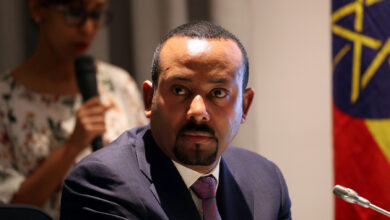
Ethiopian Government Rejects Arab League’s Proposal On Controversial Nile Dam
The Ethiopian government has rejected an Arab League proposal that calls for the United Nations Security Council to intervene in…
Read More » -
Egypt

Sudanese Irrigation Minister Says Open To Interim Deal On GERD Dam With Ethiopia
Sudanese Irrigation Minister Yasir Abbas on Monday said Sudan is open to a partial interim agreement on Ethiopia’s Grand Ethiopian…
Read More » -
Egypt
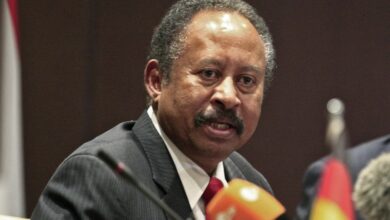
Sudanese Prime Minister Hamdok Stresses Need To Reach A Legal Deal On GERD
Sudanese Prime Minister Abdullah Hamdok on Sunday stressed the need to reach a binding legal agreement about the filling and…
Read More » -
Egypt

Sudan, Egypt Calls Out Ethiopia To Negotiate, Finalize Deal On Controversial Nile Dam
Sudan and Egypt on Wednesday issued a joint statement that said that the countries would coordinate efforts to pressurize Ethiopia…
Read More » -
Egypt

Egypt Warns Second Filing Of Mega Nile Dam Could Have Catastrophic Effects
Egypt on Tuesday warned the second filing of the controversial Grand Ethiopian Renaissance Dam (GERD) without reaching a legal and…
Read More » -
Egypt

Egyptian Health Ministry Receives 1.7 Million AstraZeneca Vaccine Doses Via COVAX
The Egyptian Health Ministry on Thursday said the government has received a shipment of more than 1.7 million AstraZeneca coronavirus…
Read More » -
Egypt

Egyptian Company To Start Manufacturing China’s Sinovac Covid-19 Vaccine In June
Egyptian Health Minister Hala Zayed on Sunday said the country will start local production of 60 million doses of the…
Read More » -
Egypt

Ethiopia Will Follow African Union-Led Tripartite Negotiation Process On Nile Dam
Ethiopia’s Foreign Ministry spokesman Dina Mufti on Saturday said Ethiopia will follow the African Union-led process concerning trilateral negotiations on…
Read More » -
Egypt
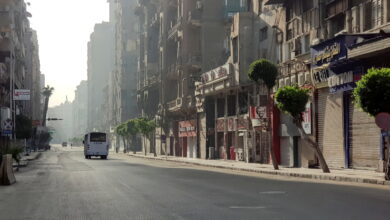
Egypt’s Government Announces New Set Of Anti-COVID 19 Measures For Two Weeks
Egypt’s government on Wednesday announced a slew of new anti-COVID 19 measures amid an increasing number of coronavirus cases in…
Read More » -
Egypt

Sudanese Irrigation Minister Warns Of Legal Action Against Ethiopia Over GERD
Sudanese Minister of Irrigation and Water Resources, Yasser Abbas, on Friday, warned his government would take legal action against Ethiopia…
Read More » -
Egypt
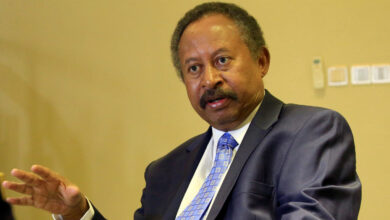
Sudanese Prime Minister Hamdok Invites Ethiopia, Egypt To Nile Dam Summit
Sudanese Prime Minister Abdalla Hamdok on Tuesday invited his Ethiopian and Egyptian counterparts for a tripartite summit to resolve disputes…
Read More » -
Egypt
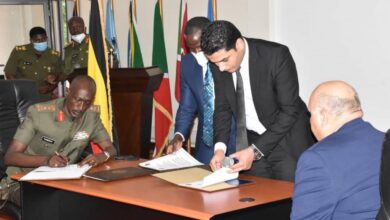
Egypt, Uganda Sign Military Intelligence Sharing Agreement Amid Nile Dam Row
Egypt has signed a memorandum of understanding with Uganda on military intelligence sharing, Ugandan officials confirmed on Thursday, amid growing…
Read More » -
Egypt

Egyptian President Warns All Options Open After Dam Talks End Sans A Deal
Egyptian President Abdel Fattah al-Sisi on Wednesday warned that “all options are open” after the latest round of talks over…
Read More » -
Egypt

Egypt’s Foreign Ministry Confirms Latest Round Of Negotiation Talks On GERD Fail
Egypt’s Foreign Ministry on Tuesday confirmed that the latest round of negation talks between Egypt, Ethiopia, and Sudan over the…
Read More » -
Egypt

Sudan Calls For Adopting New Approach In Latest Round Of GERD Negotiation Talks
Sudan on Monday called for adopting a new approach to negotiations over the Grand Ethiopian Renaissance Dam (GERD) on the…
Read More » -
Democratic Republic of the Congo
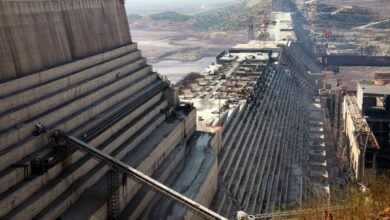
DRC To Host Negotiation Talks On Controversial Grand Ethiopian Renaissance Dam Issue
The Democratic Republic of Congo (DRC) will host a three-day meeting in Kinshasa where foreign ministers of Egypt, Ethiopia, and…
Read More » -
Egypt
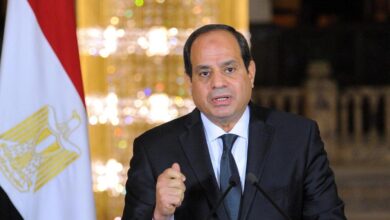
Egyptian President Warns No One Can Take A Drop From Egypt’s Water Over GERD Issue
Egyptian President Abdel Fattah el-Sisi on Tuesday warned there would be severe regional consequences if the country’s water supply were…
Read More » -
Egypt

Sudan Says EU, U.S. Ready To Mediate In Ethiopia’s Controversial Nile Dam Issue
Sudan’s Sovereign Council on Monday said the United States and the European Union have expressed readiness to mediate in the…
Read More »

